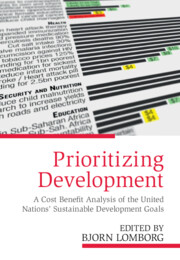 Prioritizing Development
Prioritizing Development Published online by Cambridge University Press: 30 May 2018
Introduction
In the broad area of building stable and peaceful societies, the UN High-Level Panel (HLP) has identified several areas where the benefit-cost ratio may be very high and that have been relatively neglected by the development community to date. There are areas where the current economic and social costs are plausibly quite large, and where the amount of attention is very small in comparison to other areas such as health, education, and governance reform. We argue that there is a strong case for making societal violence reduction a priority in the post-2015 Sustainable Development Goals.
When thinking about the costs of violence, the international community has focused primarily on civil wars. However, for each battlefield death in civil war, about nine times as many people are killed in interpersonal disputes, including many killings related to drug trafficking, intimate partner violence (of all homicides, 7 percent female and 5 percent male), and killing of children (7 percent). About 43 percent of all female homicide victims were killed by a current or former intimate partner.
Beyond the 418,000 homicides, reported crime figures suggest that there are about 300,000 cases of sexual violence, of which almost one-third are committed against children. There are also more than 2 million cases of assault. In addition to these reported crime figures, survey estimates suggest that about 275 million children are subjected to violent physical discipline in their homes, that 100 million girls and women live with female genital mutilation, and that about 30 percent of all partnered women have been subjected to intimate partner violence during their lifetime. This corresponds to about 769 million women.
Thus, physical violence in societies is a much larger and more pervasive phenomenon than just civil war violence. Figures for homicides and violence in low- and middle-income countries are summarized in Figures 4.1 and 4.2. As we discuss later, a number of studies suggest that the strictly economic consequences are very large and, of course, will be much larger if we try to factor in social damage and individual suffering, and yet a tiny fraction of aid funding goes toward reducing societal violence or improving criminal justice systems.
To save this book to your Kindle, first ensure [email protected] is added to your Approved Personal Document E-mail List under your Personal Document Settings on the Manage Your Content and Devices page of your Amazon account. Then enter the ‘name’ part of your Kindle email address below. Find out more about saving to your Kindle.
Note you can select to save to either the @free.kindle.com or @kindle.com variations. ‘@free.kindle.com’ emails are free but can only be saved to your device when it is connected to wi-fi. ‘@kindle.com’ emails can be delivered even when you are not connected to wi-fi, but note that service fees apply.
Find out more about the Kindle Personal Document Service.
To save content items to your account, please confirm that you agree to abide by our usage policies. If this is the first time you use this feature, you will be asked to authorise Cambridge Core to connect with your account. Find out more about saving content to Dropbox.
To save content items to your account, please confirm that you agree to abide by our usage policies. If this is the first time you use this feature, you will be asked to authorise Cambridge Core to connect with your account. Find out more about saving content to Google Drive.